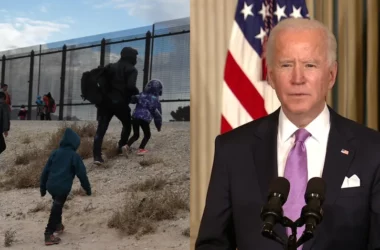The Biden administration’s unwavering support for Israel during its conflict with Hamas in Gaza has resulted in significant international repercussions, leaving the U.S. president politically isolated on the world stage, according to a prominent geopolitical commentator. This staunch backing, encompassing political, financial, and military dimensions, has been a longstanding element of Washington’s Middle East foreign policy. However, the repercussions of the recent conflict have cast a shadow over President Biden’s global standing.
Following a brutal attack by Hamas on October 7, where over 1,200 people were killed and more than 240 were taken hostage, President Biden expressed solidarity with Israel, committing billions of dollars in military support. This support adds to the existing annual military aid of $3.1 billion, making Israel the largest recipient of American foreign aid globally. However, the scale of Palestinian casualties caused by Israeli airstrikes and ground operations led to global condemnation of both Israel and the Biden administration, particularly in the Global South.
Protests erupted in major cities worldwide, with demands for a cease-fire and expressions of support for Palestinians making headlines across Europe and the U.S. During United Nations General Assembly votes calling for cease-fires, Israel and the U.S. often found themselves in the minority, or even alone, in voting against such resolutions. This isolation on the global stage has drawn comparisons to Russia’s isolation after its invasion of Ukraine.
Leaders and human rights organizations globally have condemned the U.S. for its steadfast support of Israel. While the Biden administration acknowledges the loss of Palestinian lives and supports humanitarian efforts, it maintains that Israel has the right to defend itself. However, critics argue that this stance gives Israel carte blanche in its military operations, fueling discontent and tarnishing the U.S.’s credibility in the Arab world.
Internally, President Biden faces a complex situation. A majority of Democrats align increasingly with the Palestinian position, while Republicans criticize him for being too soft on Israel. The ongoing conflict remains a pressing issue, with Biden striving to bring it to an end and out of the headlines. However, recent developments indicate an expanding conflict in Gaza, impacting Palestinian civilians and triggering proxy wars in the region.
Geopolitical analyst Ian Bremmer emphasizes the challenging nature of the situation for U.S. foreign policy, drawing attention to the escalating conflict, increasing impact on Palestinian civilians, and proxy wars in the region. The U.S. is urged to reassess its role and demand adherence to international law from all parties involved, irrespective of their alliances.
President Biden’s steadfast support for Israel during the conflict with Hamas has led to substantial international and domestic challenges. The fallout from the Gaza conflict raises concerns about the broader implications for U.S. foreign policy, as the Biden administration grapples with global isolation, criticism from allies and adversaries alike, and the complex dynamics of the ongoing conflict in the Middle East.








